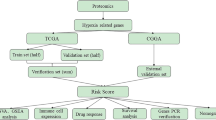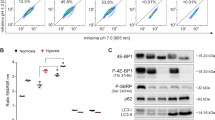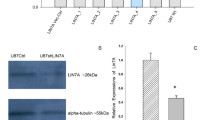Abstract
Aim:
Probucol, an anti-hyperlipidemic drug, has been reported to exert antitumor activities at various stages of tumor initiation, promotion and progression. In this study we examined whether the drug affected glioma cell growth in vitro and the underlying mechanisms.
Methods:
Human glioma U87 and glioblastoma SF295 cell lines were used. Cell proliferation was accessed using the cell proliferation assay and BrdU incorporation. The phosphorylation of AMPK, liver kinase B1 (LKB1) and p27Kip1 was detected by Western blot. The activity of 26S proteasome was assessed with an in situ fluorescent substrate. siRNAs were used to suppress the expression of the relevant signaling proteins.
Results:
Treatment of U87 glioma cells with probucol (10–100 μmol/L) suppressed the cell proliferation in dose- and time dependent manners. Meanwhile, probucol markedly increased the ROS production, phosphorylation of AMPK at Thr172 and LKB1 at Ser428 in the cells. Furthermore, probucol significantly decreased 26S proteasome activity and increased p27Kip1 protein level in the cells in an AMPK-dependent manner. Probucol-induced suppression of U87 cell proliferation could be reversed by pretreatment with tempol (a superoxide dismutase mimetic), MG132 (proteasome inhibitor) or compound C (AMPK inhibitor), or by gene silencing of LKB1, AMPK or p27Kip1. Similar results were observed in probucol-treated SF295 cells.
Conclusion:
Probucol suppresses human glioma cell proliferation in vitro via ROS production and LKB1-AMPK activation, which reduces 26S proteasome-dependent degradation of p27Kip1.
Similar content being viewed by others
Log in or create a free account to read this content
Gain free access to this article, as well as selected content from this journal and more on nature.com
or
References
Ricard D, Idbaih A, Ducray F, Lahutte M, Hoang-Xuan K, Delattre JY . Primary brain tumours in adults. Lancet 2012; 379: 1984–96.
Van Meir EG, Hadjipanayis CG, Norden AD, Shu HK, Wen PY, Olson JJ . Exciting new advances in neuro-oncology: the avenue to a cure for malignant glioma. CA Cancer J Clin 2010; 60: 166–93.
Wong ML, Kaye AH, Hovens CM . Targeting malignant glioma survival signalling to improve clinical outcomes. J Clin Neurosci 2007; 14: 301–8.
Jansen M, Ten Klooster JP, Offerhaus GJ, Clevers H . LKB1 and AMPK family signaling: the intimate link between cell polarity and energy metabolism. Physiol Rev 2009; 89: 777–98.
Xie Z, Dong Y, Scholz R, Neumann D, Zou MH . Phosphorylation of LKB1 at serine 428 by protein kinase C-zeta is required for metformin-enhanced activation of the AMP-activated protein kinase in endothelial cells. Circulation 2008; 117: 952–62.
Zhou R, Wang L, Xu X, Chen J, Hu LH, Chen LL, et al. Danthron activates AMP-activated protein kinase and regulates lipid and glucose metabolism in vitro. Acta Pharmacol Sin 2013; 34: 1061–9.
Zou MH, Kirkpatrick SS, Davis BJ, Nelson JS, Wiles WG 4th, Schlattner U, et al. Activation of the AMP-activated protein kinase by the anti-diabetic drug metformin in vivo. Role of mitochondrial reactive nitrogen species. J Biol Chem 2004; 279: 43940–51.
Song P, Wang S, He C, Liang B, Viollet B, Zou MH . AMPKalpha2 deletion exacerbates neointima formation by upregulating Skp2 in vascular smooth muscle cells. Circ Res 2011; 109: 1230–9.
Fu YN, Xiao H, Ma XW, Jiang SY, Xu M, Zhang YY . Metformin attenuates pressure overload-induced cardiac hypertrophy via AMPK activation. Acta Pharmacol Sin 2011; 32: 879–87.
Kyaw M, Yoshizumi M, Tsuchiya K, Izawa Y, Kanematsu Y, Tamaki T . Atheroprotective effects of antioxidants through inhibition of mitogen-activated protein kinases. Acta Pharmacol Sin 2004; 25: 977–85.
Yamashita S, Matsuzawa Y . Where are we with probucol: a new life for an old drug? Atherosclerosis 2009; 207: 16–23.
Liu GX, Ou DM, Li LX, Chen LX, Huang HL, Liao DF, et al. Probucol inhibits oxidized-low density lipoprotein-induced adhesion of monocytes to endothelial cells in vitro. Acta Pharmacol Sin 2002; 23: 516–22.
Sawayama Y, Shimizu C, Maeda N, Tatsukawa M, Kinukawa N, Koyanagi S, et al. Effects of probucol and pravastatin on common carotid atherosclerosis in patients with asymptomatic hypercholesterolemia. Fukuoka Atherosclerosis Trial (FAST). J Am Coll Cardiol 2002; 39: 610–6.
Tardif JC, Cote G, Lesperance J, Bourassa M, Lambert J, Doucet S, et al. Probucol and multivitamins in the prevention of restenosis after coronary angioplasty. Multivitamins and Probucol Study Group. N Engl J Med 1997; 337: 365–72.
Iqbal M, Okazaki Y, Okada S . Probucol modulates iron nitrilotriacetate (Fe-NTA)-dependent renal carcinogenesis and hyperproliferative response: diminution of oxidative stress. Mol Cell Biochem 2007; 304: 61–9.
Lee DH, Lee TH, Jung CH, Kim YH . Wogonin induces apoptosis by activating the AMPK and p53 signaling pathways in human glioblastoma cells. Cell Signal 2012; 24: 2216–25.
Schuetz TA, Becker S, Mang A, Toma A, Buzug TM . A computational multiscale model of glioblastoma growth: regulation of cell migration and proliferation via microRNA-451, LKB1 and AMPK. Conf Proc IEEE Eng Med Biol Soc 2012; 2012: 6620–3.
Ferla R, Haspinger E, Surmacz E . Metformin inhibits leptin-induced growth and migration of glioblastoma cells. Oncol Lett 2012; 4: 1077–81.
Godlewski J, Nowicki MO, Bronisz A, Nuovo G, Palatini J, De Lay M, et al. MicroRNA-451 regulates LKB1/AMPK signaling and allows adaptation to metabolic stress in glioma cells. Mol Cell 2010; 37: 620–32.
Wang S, Xu J, Song P, Wu Y, Zhang J, Chul Choi H, et al. Acute inhibition of guanosine triphosphate cyclohydrolase 1 uncouples endothelial nitric oxide synthase and elevates blood pressure. Hypertension 2008; 52: 484–90.
Wang S, Zhang M, Liang B, Xu J, Xie Z, Liu C, et al. AMPKalpha2 deletion causes aberrant expression and activation of NAD(P)H oxidase and consequent endothelial dysfunction in vivo: role of 26S proteasomes. Circ Res 2010; 106: 1117–28.
Xu J, Wu Y, Song P, Zhang M, Wang S, Zou MH . Proteasome-dependent degradation of guanosine 5′-triphosphate cyclohydrolase I causes tetrahydrobiopterin deficiency in diabetes mellitus. Circulation 2007; 116: 944–53.
Tanous D, Hime N, Stocker R . Anti-atherosclerotic and anti-diabetic properties of probucol and related compounds. Redox Rep 2008; 13: 48–59.
Choi HC, Song P, Xie Z, Wu Y, Xu J, Zhang M, et al. Reactive nitrogen species is required for the activation of the AMP-activated protein kinase by statin in vivo. J Biol Chem 2008; 283: 20186–97.
Wang S, Zhang C, Zhang M, Liang B, Zhu H, Lee J, et al. Activation of AMP-activated protein kinase alpha2 by nicotine instigates formation of abdominal aortic aneurysms in mice in vivo. Nat Med 2012; 18: 902–10.
Liu DC, Zang CB, Liu HY, Possinger K, Fan SG, Elstner E . A novel PPAR alpha/gamma dual agonist inhibits cell growth and induces apoptosis in human glioblastoma T98G cells. Acta Pharmacol Sin 2004; 25: 1312–9.
Liang J, Shao SH, Xu ZX, Hennessy B, Ding Z, Larrea M, et al. The energy sensing LKB1-AMPK pathway regulates p27(kip1) phosphorylation mediating the decision to enter autophagy or apoptosis. Nat Cell Biol 2007; 9: 218–24.
Colle D, Santos DB, Moreira EL, Hartwig JM, dos Santos AA, Zimmermann LT, et al. Probucol increases striatal glutathione peroxidase activity and protects against 3-nitropropionic acid-induced pro-oxidative damage in rats. PLoS One 2013; 8: e67658.
Wu YJ, Sala-Newby GB, Shu KT, Yeh HI, Nakayama KI, Nakayama K, et al. S-phase kinase-associated protein-2 (Skp2) promotes vascular smooth muscle cell proliferation and neointima formation in vivo. J Vasc Surg 2009; 50: 1135–42.
Acknowledgements
This study was supported by the National Natural Science Foundation of China (No 81371222).
Author information
Authors and Affiliations
Corresponding author
Rights and permissions
About this article
Cite this article
Jiang, Ys., Lei, Ja., Feng, F. et al. Probucol suppresses human glioma cell proliferation in vitro via ROS production and LKB1-AMPK activation. Acta Pharmacol Sin 35, 1556–1565 (2014). https://doi.org/10.1038/aps.2014.88
Received:
Accepted:
Published:
Issue date:
DOI: https://doi.org/10.1038/aps.2014.88
Keywords
This article is cited by
-
PGC-1α promotes colorectal carcinoma metastasis through regulating ABCA1 transcription
Oncogene (2023)
-
CREB1 regulates glucose transport of glioma cell line U87 by targeting GLUT1
Molecular and Cellular Biochemistry (2017)



